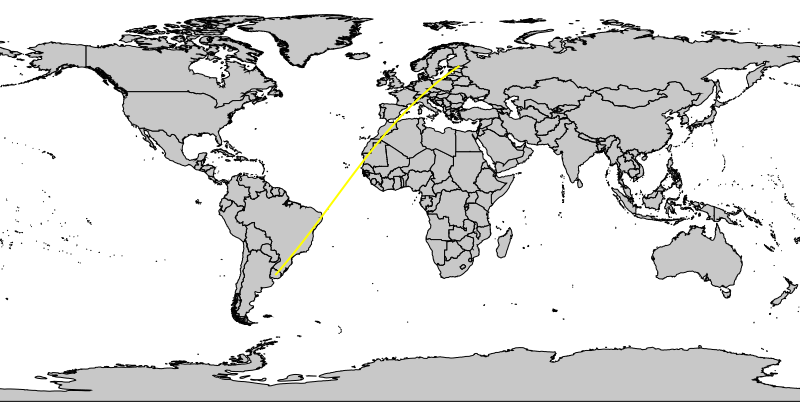d.rhumbline
Displays the rhumbline joining two longitude/latitude coordinates.
d.rhumbline coordinates=lon1,lat1,lon2,lat2 [line_color=name] [--verbose] [--quiet] [--qq] [--ui]
Example:
d.rhumbline coordinates=0.0
grass.script.run_command("d.rhumbline", coordinates, line_color="black", verbose=None, quiet=None, superquiet=None)
Example:
gs.run_command("d.rhumbline", coordinates=0.0)
grass.tools.Tools.d_rhumbline(coordinates, line_color="black", verbose=None, quiet=None, superquiet=None)
Example:
tools = Tools()
tools.d_rhumbline(coordinates=0.0)
This grass.tools API is experimental in version 8.5 and expected to be stable in version 8.6.
Parameters
coordinates=lon1,lat1,lon2,lat2 [required]
Starting and ending coordinates
line_color=name
Line color
Either a standard color name or R:G:B triplet
Default: black
--help
Print usage summary
--verbose
Verbose module output
--quiet
Quiet module output
--qq
Very quiet module output
--ui
Force launching GUI dialog
coordinates : tuple[float, float, float, float] | list[float] | str, required
Starting and ending coordinates
Used as: input, coords, lon1,lat1,lon2,lat2
line_color : str, optional
Line color
Either a standard color name or R:G:B triplet
Used as: input, color, name
Default: black
verbose : bool, optional
Verbose module output
Default: None
quiet : bool, optional
Quiet module output
Default: None
superquiet : bool, optional
Very quiet module output
Default: None
coordinates : tuple[float, float, float, float] | list[float] | str, required
Starting and ending coordinates
Used as: input, coords, lon1,lat1,lon2,lat2
line_color : str, optional
Line color
Either a standard color name or R:G:B triplet
Used as: input, color, name
Default: black
verbose : bool, optional
Verbose module output
Default: None
quiet : bool, optional
Quiet module output
Default: None
superquiet : bool, optional
Very quiet module output
Default: None
Returns:
result : grass.tools.support.ToolResult | None
If the tool produces text as standard output, a ToolResult object will be returned. Otherwise, None will be returned.
Raises:
grass.tools.ToolError: When the tool ended with an error.
DESCRIPTION
A rhumbline (loxodrome) is a line following a constant angle of the compass (i.e., a line of constant direction). It crosses all meridians at the same angle, i.e. a path of constant bearing. d.rhumbline displays the rhumbline joining any two user-specified points in the active frame on the user's graphics monitor. The named coordinate locations must fall within the boundaries of the user's current geographic region.
The user has to specify the starting and ending longitude/latitude coordinates of the rhumbline and (optionally) the color in which the rhumbline will be displayed; in this case, the program will run non-interactively.
EXAMPLE
A geodesic line if shown over the political map of the world (demolocation dataset):
g.region vector=country_boundaries -p
d.mon wx0
d.vect country_boundaries type=area
d.rhumbline coordinates=55:58W,33:18S,26:43E,60:37N \
line_color=yellow
# show additionally 10 degree grid
d.grid 10
NOTES
This program works only with longitude/latitude coordinate system.
SEE ALSO
AUTHOR
Michael Shapiro, U.S. Army Construction Engineering Research Laboratory
SOURCE CODE
Available at: d.rhumbline source code
(history)
Latest change: Tuesday Feb 18 17:20:26 2025 in commit 688e625
